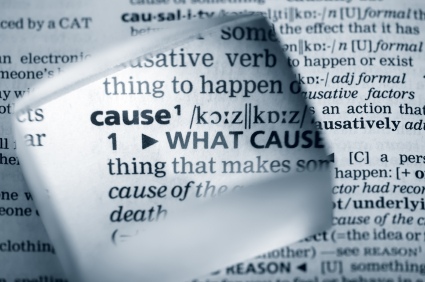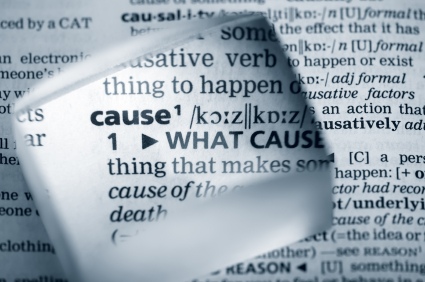 Last week, Andy Revkin wrote an opinion column in The New York Times about whether climate change can be said to have caused recent extreme weather disasters, and Michael Levi and Bryan Walsh both covered a new paper about whether climate change causes civil wars in sub-Saharan Africa. So it goes: There’s a long history of disputes over whether climate change causes this or that unpleasantness. In my experience, these disputes tend to be conceptually muddled, and a lot of what appears to be substantive disagreement reduces to semantics. Worse, a lot of essentially semantic disputes are being drafted in service of sociopolitical axe-grinding.
Last week, Andy Revkin wrote an opinion column in The New York Times about whether climate change can be said to have caused recent extreme weather disasters, and Michael Levi and Bryan Walsh both covered a new paper about whether climate change causes civil wars in sub-Saharan Africa. So it goes: There’s a long history of disputes over whether climate change causes this or that unpleasantness. In my experience, these disputes tend to be conceptually muddled, and a lot of what appears to be substantive disagreement reduces to semantics. Worse, a lot of essentially semantic disputes are being drafted in service of sociopolitical axe-grinding.
Let’s abstract from the specific questions a bit, then, and think about just what it means for climate change to “cause” something.
Global heavying
I’m going to get a bit wanky below, but for fun let’s begin with a metaphor. Imagine something humans are doing is raising the earth’s gravity. By 2050 gravity could be up as much as 5 percent, or so scientists claim. They call it “global heavying.”
If gravity rises, more people are going to trip and fall. Exactly how many more is the subject of some dispute, but there’s a fairly robust consensus that, statistically, tripping is going to go up. It’s already noticeable; people have been tripping a lot lately, though in some areas and among some demographics tripping is still within the range of historical precedent.
You’re walking down the sidewalk one day and, sure enough, you trip and fall. Did global heavying cause you to trip? Well, of course not. You were hungover, or absent-minded, or ogling someone. You didn’t see a bump in the sidewalk. Whatever. Dozens of proximate factors — attention, balance, surface composition, wind, visibility — are in front of global heavying in the causal queue. The global rise in gravity changes the probability and thus the incidence of tripping, but it does not “cause” any particular person to trip.
I’m only Hume, man
 David HumeNot to put too fine a point on it, but so what? The danger of climate change is not that it’s going to ride down like the Four Horsemen and cause a super-storm (à la The Day After Tomorrow). It’s that it raises the probability of extreme weather phenomena. It shifts the odds at the margins.
David HumeNot to put too fine a point on it, but so what? The danger of climate change is not that it’s going to ride down like the Four Horsemen and cause a super-storm (à la The Day After Tomorrow). It’s that it raises the probability of extreme weather phenomena. It shifts the odds at the margins.
The great 18th century Scottish philosopher David Hume was an early and eloquent proponent of the viewpoint that causation is a bit like God — we’re in the habit of believing in it, but we cannot verify it empirically. Causation is a metaphysical “relationship of necessity,” but no such relationship can be observed. All that’s available to our senses are certain “constant conjunctions.” We can see that B typically follows A, but saying “A causes B” is just to elevate that correlation to glorified but unsupportable metaphysical status. According to Hume, all we can do, if we are being precise, is note regularities.
No need to relegislate Hume’s work, but it is worth noting that Enlightenment empiricism helped free those investigating the natural world from a lot of cobwebbed metaphysical notions. The commitment to stick with what can be observed, to describe the world (both natural and human) in terms of probabilistic correlation rather than metaphysical necessity, helped usher in centuries of expansion in scientific knowledge. The scientific method is Hume’s skepticism made practice.
In common vernacular, we say that smoking causes lung cancer. Scientifically speaking, we say people who smoke are statistically more likely to develop lung cancer than non-smokers, all else being equal. It’s impossible to say that a given case of lung cancer was caused by smoking — each individual case is an interplay of genetics, circumstances, and behavior complex beyond our ken. This fact complicates our understanding of responsibility and liability, but it does nothing to diminish the danger of smoking.
Error bar blues
The more complex the phenomena we investigate, the wider the confidence interval of our theories about it. We know that human activity is adding greenhouse gases to the atmosphere at a historically rapid pace. We know that more GHGs will cause the atmosphere to trap more of the sun’s energy. We know that with more energy in the atmosphere, the probability of extreme weather phenomena rises. And we know that a rise in extreme weather phenomena will, all else being equal, increase human suffering.
The error bars on our theories and predictions just get larger as we progress from basic atmospheric physics to complex social phenomena like civil wars. No matter how much sh*t starts going down as the atmosphere warms, there will never come a time when we can point at one episode and say, “Aha, now that was caused by climate change!” It’s just a category mistake to think that way, like blaming your tripping on global heavying. But just as with smoking, that does nothing to diminish the danger of climate change.
Arguments over whether climate change caused a particular year’s sea ice loss or wildfires or civil wars are orthogonal to understanding and responding to it. Such arguments are mainly undertaken for polemic purposes. Climate campaigners think they can galvanize the public if they pin a disaster on climate change; climate deniers think they can cast doubt on climate change if they exonerate it. Whoever’s right, it’s worth remembering that nothing of policy-relevant substance hinges on the answer.



